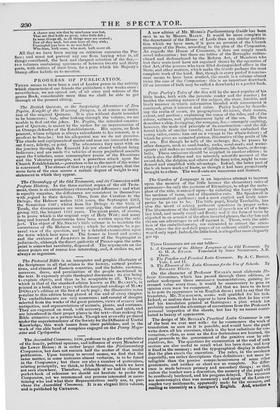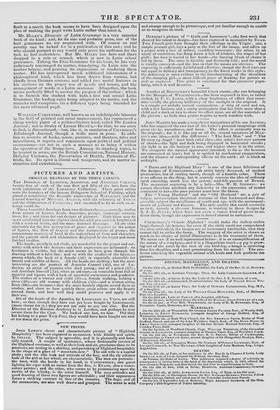Three Grammars are on our table-
On the character of Professor Ewsen's most elaborate He- brew Grammar, which has passed through three editions, or rather undergone three successive transmutations, gaining in- creased value every time, it would be unnecessary to pass an opinion even were we competent. All that we have to do here is to note its appearance in an English dress; and to say that the translator, Mr. Nienossose seems well qualified for his task. Indeed, so zealous does he appear to have been, that he has even had his translation printed at Gottingen: a plan which has probably secured the advantage of correctness from the Professor's personal inspection of the sheets, but has by no means contri- buted to beauty of appearance.
The design of Mr. BEILLE's Practical Latin Grammar is one of the best we ever met with: for he commences the work of translation as soon as it is possible, and would have the pupil write down all his exercises, which is the best substitute for con- versation,—thus, as soon as the five declensions are learned, the pupil proceeds to the government of the genitive case by sub- stantives, &c. The questions for examination at the end of each section are also useful to recall what has been done, and keep it fixed-in the memory; and the typographical display is distinct. But the plan excels the execution. The rules, in the accidence especially, are rather descriptions than definitions ; not more in- telligible than the precise comprehensiveness of some other grammars, and neither so short nor so complete. No differ- ence is made between primary and secondary things; so that, unless the teacher uses a discretion, the memory of the pupil will be needlessly burdened, and his progress delayed. The exercises are more complex than was necessary ; and many of the Latin ex- araples very unidiomatic, apparently made for the occasion, and readiug as uncouthly u a, foreigner's English. And, whether *
fault or a merit, the book seems to have been designed upon the plan of making the pupil write Latin rather than learn it.
Mr. HILEY'S Elements of Latin Grammar is a very superior book of its kind; and, for its size and probable price, one of the best grammars we are acquainted with. Of course no real novelty can be looked for in a publication of this sort ; and he who should pretend to any would only prove his unfitness for the task he had undertaken. But Mr. HUEY has here and there dropped in a rule or remark which is new in Latin school grammars. Taking the Eton Grammar for his basis, he has very judiciously rearranged its matter, translating its Latin into the mother tongue, and pruning its expressions or rendering them neater. He has interspersed much additional information of a philosophical kind, which has been drawn from various, but chiefly from German sources; and added two useful features in his sections on the proper use of moods and tenses, and the arrangement of words in a Latin sentence. Altogether, the book seems perfectly fitted to answer the purpose of the author ; which is to furnish the student with both a first and second Latin Grammar, the leading rules being adapted to the novice, and the remarks and exceptions (in a clifferent type) being intended for the more advanced pupil.



























 Previous page
Previous page